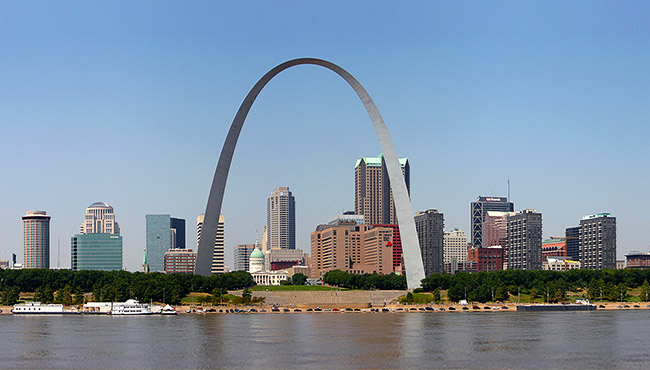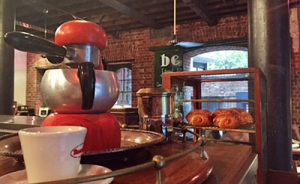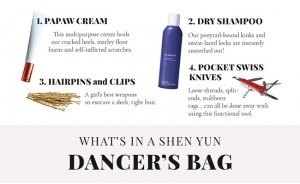
East Meets West Over Coffee in St. Louis
Long before we arrived in St. Louis, we could see the iconic Gateway Arch in the distance welcoming us on our journey. The Arch symbolizes the early Americans’ traveling West to seek their destinies and I found myself thinking of the famous saying, “Go West, young man.” In fact, Shen Yun is based on the East Coast and the Chinese culture we present is regarded as being from the East as well. Thus, the Gateway Arch was part of our own journey to the West.
Nowadays, with the aid of modern technology, the world is getting smaller. We’re able to see, hear, and experience what our ancestors once spent their lives only dreaming of. With the internet, we’re able to access a seemingly infinite amount of information. With airplanes, we are able to fly to the other side of the world and back in a few days. Countless immigrants have brought their cultures and lifestyles with them to their new homes. Chinatowns, Korean markets, Italian restaurants, and French pastries are available in every big city.
But with this mass diffusion of cultures, there also comes a downside: we get used to everything being everywhere and things start to get blurred into one big pot of jambalaya. The fine lines of people’s unique cultural identities start to get fuzzy. Many audience members express their admiration for Chinese culture after watching Shen Yun’s performance. Why is that? Because Shen Yun’s performance portrays authentic Chinese culture, inspired by 5,000 years of Chinese civilization.
And at the same time, there’s nothing wrong with cross-cultural infusion; it’s enthralling to learn about or experience other cultures. And I found a recent example of this in St. Louis—at Starbucks.
There was one conveniently close to our hotel. Almost every morning, you could see groggy-eyed Shen Yun members suited handsomely in black wool coats, braving the early morning befuddlement on their way to Starbucks. Traditionally, coffee was regarded as a part of Western culture, whereas the Chinese drank tea, but there’s something about a cup of hot coffee on a cold, gloomy morning. After all, morning grogginess isn’t limited to any ethnicity!
During our stay in St. Louis, we became informally acquainted with our neighbors—two dance teams and a volleyball team, composed of teenagers ranging from about 10 to 18 years old by the looks of them. They also made frequent trips to Starbucks. Between those kids and us, Starbucks made a lot of money those few days.
The kids ordered smoothies and Frappuccinos. We, on the other hand, ordered espressos, lattes, and macchiatos. As my fellow dancer Chelsea Cai reported, “This morning I got up at 6:30 and went to Starbucks. I saw many of the dance team kids ordering fruit smoothies and other cold drinks. They gave me looks of bewilderment when I walked up to the cashier and said, ‘Hi, I would like a grande latte macchiato with three shots ristretto, 2/3 decaf, upside down, and 2 percent extra foam steamed milk.’”
Many of my fellow performers are, in my humble view, coffee connoisseurs. I’m one of those who wanders cluelessly into a Starbucks only to stand there squinting at the menu for an extended period before scuffling up to the cashier and nervously ordering a “medium caffe latte” to the utmost horror of my Starbucks-membership-card-wielding friends. I was surprised to discover that the caffe latte, cappucino, and flat white were unsweetened. I’ve inspired countless face palms, eye rolls, and groans of mortification from my fellow dancers.
I used to not drink coffee at all, so I consider my ventures to Starbucks, although awkward, an improvement: my own contribution to cultural diffusion, like crossing a small Gateway Arch where East meets West.
Editor’s note: This is the third and final (for now) in a series of blogs about coffee culture on Shen Yun tour.

Lois Kuang
Contributing writer
April 5, 2016



